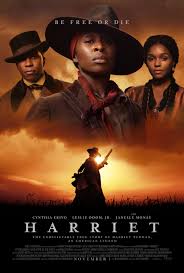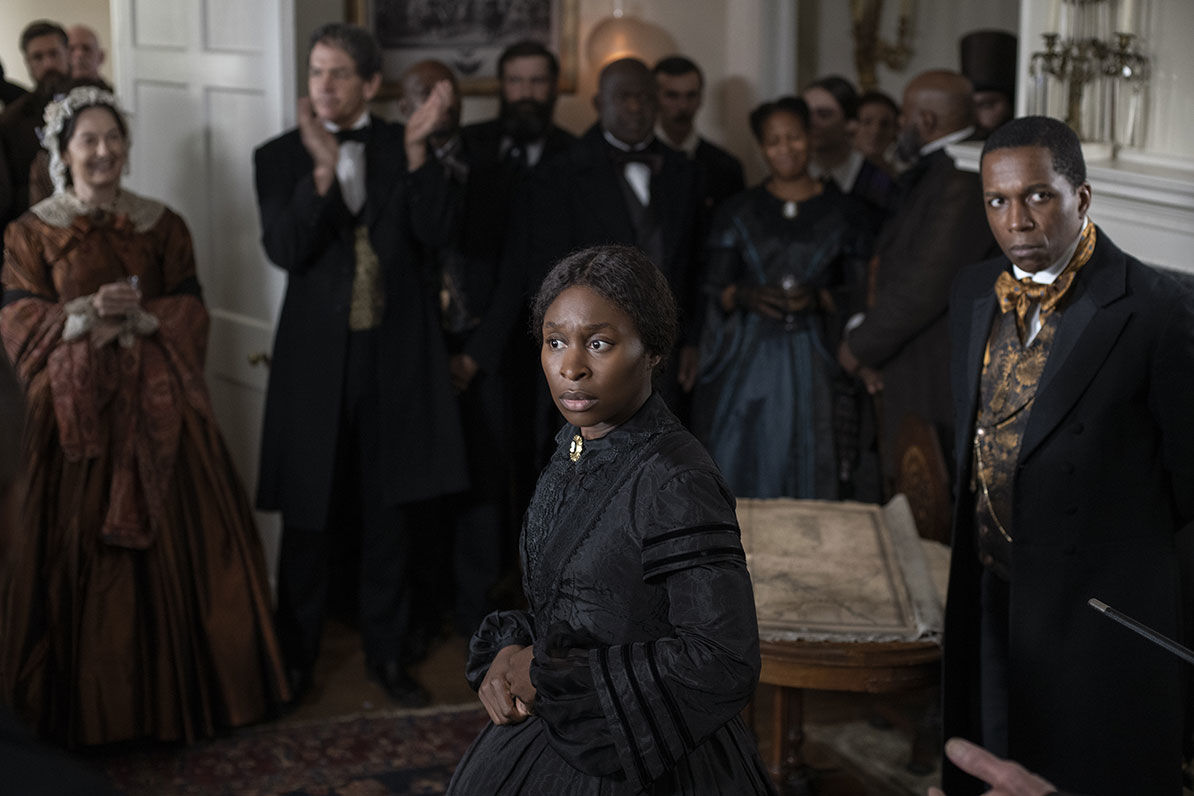Difference between revisions of "Harriet (2019)"
| Line 40: | Line 40: | ||
<references /> | <references /> | ||
| − | [[Category: Black | + | [[Category: Black Racism in Drama Movies]] |
| + | [[Category: Anti-Black Racism in Drama Movies]] | ||
Revision as of 08:57, 7 January 2021
Harriet is American Drama movie directed by Kasi Lemmons, who also wrote the screenplay with Gregory Allen Howard.. This movie released on November 1, 2019 (United States) and starring Cynthia Erivo, Leslie Odom Jr., Joe Alwyn and Janelle Monáe. This movie is based on true story of Harriet Tubman, the extraordinary tale her escape from slavery and transformation into one of America's greatest heroes, whose courage, ingenuity, and tenacity freed hundreds of slaves and changed the course of history.
Harriet received several nominations including Best Actress Performance by Cynthia Erivo and Best Original Song "Stand Up" by Stand Up, Joshuah Brian Campbell, Cynthia Erivo on Golden Globes 2020.[1]
Contents
Plot
Born into slavery around 1820, Tubman, also known as Minty, had eight siblings and lived in Dorchester County, Maryland. After being smashed on the head by her slave master with a two-pound hammer, just one of the many abusive events she had been exposed to in her time as a slave, the protester endured fits and serious headaches for years to come. But she was also deeply spiritual, and she felt that God had talked to her.In 1849, following her master's death, Tubman made a decision to
escape slavery, fearing the risk of being separated from her family. While her two brothers had initially set out with her, they got cold feet when the owner of Tubman sent a letter of their escape and offered them a reward. This left Tubman alone on his path to independence. Yet the activist had learned about the enigmatic Underground Railroad and with the aid of people active with the abolitionist cause, made a 90-mile trip to liberty.
The former slave finally arrived in Philadelphia, but after working and saving some money, she decided to return to her home. Eventually, Tubman went on to rescue not only her loved ones, but thousands of others. When the Fugitive Slave Law was passed, making it possible to recapture the newly released slaves, Tubman also reconfigured the Underground Railroad course. Along with the emancipation of former slaves, Tubman donated to the Civil War and worked as a cook and nurse to the Union Army. More than that though, she was a traitor and continued to help free slaves throughout the war.[2]
In the last scenes of the film, Harriet was seen caring for her family, leading 150 black soldiers to the Combahee River Raid, freeing hundreds of slaves. The epilog at the end of the film outlines some of her accomplishments: she personally freed more than 70 slaves on the Underground Railroad and returned as a Union spy after the Civil War, leading 150 black soldiers who freed more than 750 slaves. She died at about 91 years of age, and her last words were "I go to prepare a place for you"
Black Empowerment
Simran Hans on Theguardian.com it was remakable slavery biopic without showing pain, trauma and humiliation. "Though the film is about the atrocity of slavery, Lemmons and co-writer Gregory Allen Howard (Remember the Titans) focus on liberation and solidarity, rather than amplifying pain, trauma and humiliation. So often, historical films are stale and mired in misery, but Harriet has a rare buoyancy."[3]
Rex Reed on Observer.com give 3.5 stars out of 4. "With enough terror to satisfy modern audiences and enough underplayed plot movement to save it from conventional biopic trajectory, Harriet holds interest and invites respect. It is still not the great Civil War epic it could have been, but it’s solid enough to work, and Cynthia Erivo’s valiant and committed performance is a wonderful achievement."[4]
The strength and lyrical fervor of Kasi Lemmons' direction lend this historical drama to Harriet Tubman's escape from slavery and his work with the Underground Railroad, the exalted influence of secular scripture.[5]
Controversy
Harriet biopic erases white violence – and that's a big problem
Jill Roby on Digitalspy.com think that there is a lot of white violence in the real story but can't be seen in the film. "The most violence that is shown on the screen isn't from the overseers who kept slaves in line, or even from the masters who owned them. White violence is only alluded to, But we never actually see the violence happen"[6]
Harriet as faced a lot of backlash from the black community as a "white savior"
“I swear the whole point of this Harriet movie is to restart the ‘Black men ain’t never cared about Black women’ narrative rather than tell Harriet’s story. An abomination. #NotMyHarriet,@BreakingBrown tweeted. [7]
“At the end of Harriet, she forgives the white man who was her slavemaster while she kills the Black man. In one sweep this film is saying forgive the white man but hate and never forgive the Black Man. Most anti Black movie ever made in 2019,”@BlackGlobeVilla.[8]
The stars is not American
Some say they are upset because the star of the film, Cynthia Erivo, is a British actress of Nigerian origin rather than an American descendant of enslaved women. Others are furious that Erivo insulted the so-called "ghetto accent" on Twitter six years ago.[9]
Reference
- ↑ https://www.goldenglobes.com/film/harriet
- ↑ https://www.hollywoodreporter.com/news/true-story-harriet-how-accurate-are-characters-1253182
- ↑ https://www.theguardian.com/film/2019/nov/24/harriet-review-harriet-tubman-biopic-cynthia-erivo-janelle-monae
- ↑ https://observer.com/2019/11/harriet-review-cynthia-erivo-rex-reed/
- ↑ https://www.newyorker.com/goings-on-about-town/movies/harriet
- ↑ https://www.digitalspy.com/movies/a29871460/harriet-tubman-review-violence-slavery/
- ↑ https://twitter.com/BreakingBrown/status/1189919145321811970
- ↑ https://twitter.com/BlackGlobeVilla/status/1190362598715379714?s=20
- ↑ https://whyy.org/articles/why-would-some-black-audiences-boycott-the-new-harriet-tubman-movie/


